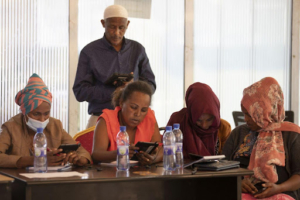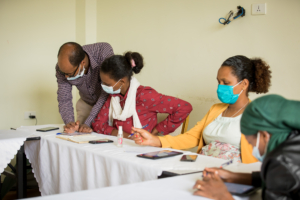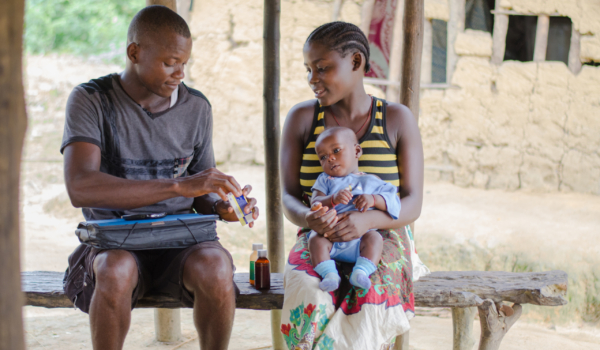The roll-out of digital tools to help health workers manage COVID-19 raised an exciting question for Last Mile Health’s Ethiopia team: what if we could leverage technology to improve other key training for the community health workforce in remote and rural areas?
Some 40,000 community health workers, known locally as health extension workers, work in communities across Ethiopia. Building from the success of the COVID-19 Ethiopia Health Worker Training Platform, the Ministry of Health invited Last Mile Health to revolutionize in-service refresher training for community health workers, intended to sustain and build their skills. Until recently, that training relied only on printed materials and in-person sessions at the district level–requiring significant travel for health workers living far from training facilities. In-person training is costly and static, limiting participants’ ability to access and practice the key competencies taught in training modules. And without contextualized, timely refresher training at their fingertips, community health workers are unable to provide the highest quality care to the patients they serve. “We needed to find a better way, using technology, so we have better learning outcomes,” says Abraham Zerihun Megentta, Last Mile Health’s Ethiopia Program Director. “So we looked at what challenges we had and what could be enhanced with a blended approach.”

Community health workers participate in a training session as part of the blended learning module pilot.
Last Mile Health adapted the training content using an innovative blended learning approach that incorporates digital and face-to-face components. The pilot module covers reproductive, maternal, neonatal, and child health–an area of especially great impact, as women and children are the biggest target groups of Ethiopia’s Health Extension Program. Rather than the traditional ten in-person sessions, participants attend two in-person sessions, complete five digital sessions using a tablet, and then return for two more in-person sessions. Digital training content is powered by culturally-appropriate multimedia in local languages, and includes animated videos and illustrations designed with a gender mainstreaming approach: the majority of community health workers are female. For in-person learning, the training prioritizes hands-on activities such as roleplay, and all sessions use quizzes to monitor comprehension and progress.
The pilot program has expanded to four regions in Ethiopia, engaging 1,122 health workers who serve a total population of approximately 2.9 million people across 20 woredas (districts).

Health workers test a digital resource in the
reproductive, maternal, neonatal, and child health blended learning training module.
“We are seeing very encouraging results,” says Abraham. From preliminary data available for one of the pilot districts, average knowledge assessment scores rose from 75% to 84% after community health workers completed the blended learning training module. And on practical skills assessments, average scores increased from 62% to 92%. Participants reported improved confidence in their skills after completing the course–and nearly all participants agreed that the training provided would help them do their jobs effectively.
“Previously, we were receiving training in English,” says Sofia Abe, a community health worker in the Oromia Region. “We used to skip the parts we couldn’t understand. But now, contents are also available in local languages we know well. We are more comfortable now.”
In addition to the training itself, the program provides in-depth data that helps our team pinpoint areas for improvement–and insights that will inform the development of additional modules. As an example, only 64% of learners passed the sick child management skills assessment in the module, which means the team will work to improve this section of the training for the next iteration.
Looking forward, we are exploring the opportunity to expand and scale this blended learning approach to reach more community health workers in partnership with the Ministry of Health. In the coming fiscal year, we will double the reach of the pilot program, accelerating a vision of community health workers equipped with the knowledge and skills they need to provide quality primary health services. For the future of Ethiopia’s community health workers–and the patients they serve each day–the potential is enormous.
“In-service training for health extension workers is critical to ensure quality healthcare. We are grateful to partner with Last Mile Health to leverage innovative digital tools and adult learning pedagogy to strengthen our in-service training on reproductive, maternal, neonatal, and child health, which will benefit Ethiopia’s women and families for years to come.”
– ISRAEL ATARO (Director, Health Extension Program and Primary Health Care Directorate at the Ethiopia Ministry of Health)




